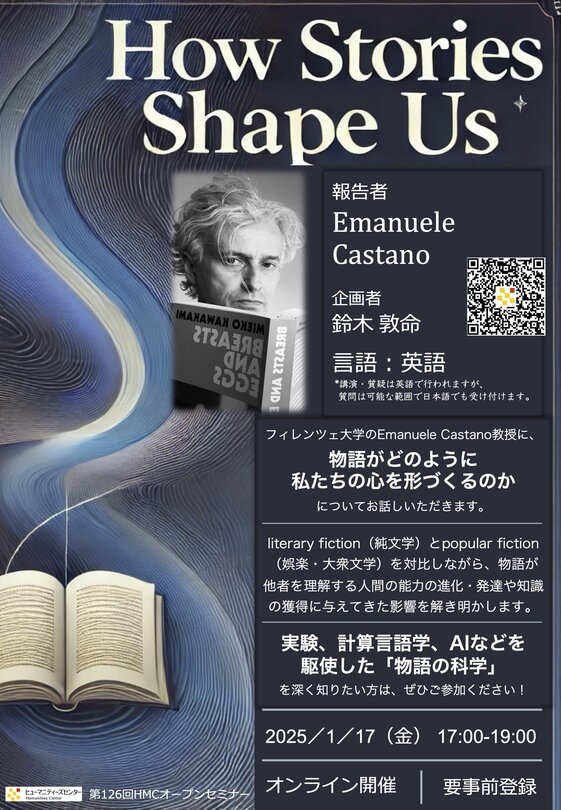How Stories Shape Us

- Date & Time: Friday, January 17th, 2025, 5:00 - 7:00 pm (JST, UTC+9)
- Venue: Online (via Zoom Meeting)
- Registration: https://u-tokyo-ac-jp.zoom.us/meeting/register/tZMof-2rrDsjHNPNxwfubPROSdlVnugNGHAh
- Speaker:
Emanuele Castano(University of Florence, The Institute for Cognitive Sciences and Technologies, National Research Council (Italy) ) - Chaired by: Suzuki Atsunobu(The University of Tokyo)
- Language: English
- Host: The University of Tokyo Humanities Center
- 日時:1月17日(金)17:00 - 19:00
- 開催形式:Zoomオンライン開催
- 報告者:Emanuele Castano(フィレンツェ大学 教授)
- 企画者: 鈴木 敦命(東京大学 大学院人文社会系研究科 准教授)
- 言語:英語
- 主催:東京大学ヒューマニティーズセンター
フィレンツェ大学のEmanuele Castano教授に、物語がどのように私たちの心を形づくるのかについてお話しいただきます。literary fiction(純文学)とpopular fiction(娯楽・大衆文学)を対比しながら、物語が他者を理解する人間の能力の進化・発達や知識の獲得に与えてきた影響を解き明かします。実験、計算言語学、AIなどを駆使した「物語の科学」を深く知りたい方は、ぜひご参加ください!
講演・質疑は英語で行われますが、質問は可能な範囲で日本語でも受け付けます。
Abstract
Storytelling played a crucial role in human evolution. To this day, through stories we humans gain declarative and procedural knowledge, learn the skills that support learning itself, and develop our social cognition architecture. Over the past decade, I have conducted research to better understand how stories help us develop such architecture, and thus influence the way we perceive and navigate the social world. The main tenet of this research is that stories are not all the same: in addition to their subject matter, stories vary in how they depict characters and their relations, on how the plot develops, and on the language they use. Merging insights from cognitive science, philosophical inquiry, and literary studies, I have thus proposed that the literary versus popular fiction distinction captures some of these important differences, and thus that reading primarily literary or popular fiction results in different social skills, attitudes, beliefs, and behavior. In this seminar, I will present my theoretical model as well as results of studies conducted using a variety of methods, ranging from human experimentation, computational linguistics, and artificial intelligence, which provide substantial support to my theoretical proposition.


